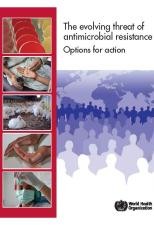
Watching the media coverage of the World Health Organization’s (WHO) just published book, The Evolving Threat of Antimicrobial Resistance – Options for Action, may teach us more about how the mainstream media operates than about this rapidly developing public health menace.
My wife, Elli, who left her job as a Pediatric Nurse Practitioner six years ago to become a fiction writer, still acts as our family’s resident medical professional. Yesterday morning she informed me over coffee that the WHO had just released a frightening new report. She said that an explosion of resistant bacteria could make common infections like strep-throat difficult or impossible to treat in the near future, and that any invasive surgery would place patients in mortal danger from untreatable infections. She concluded that while over-prescription of antibiotics was part of the problem, that agribusiness’s systematic introduction of antibiotics into the food supply was the primary culprit.
At a news conference last week in Europe the Director General of the WHO, Dr. Margaret Chan, urged governments to “restrict the use of antibiotics in food production to therapeutic purposes,” and argued that governments and companies need to regulate "how much antibiotics are used in food production.” Other solutions Dr. Chan mentioned were: “prescribing antibiotics appropriately and only when needed, following treatment correctly…and tackling the problem of substandard or counterfeit medicines.”
The WHO report caused quite a stir, and so I was not surprised that it was one of the featured stories on the NBC evening news. Anchorman Brian Williams discussed it with NBC chief medical editor Dr. Nancy Snyderman. I do not recall Dr. Snyderman’s exact words, but she listed four things we could do to keep this rapidly approaching scourge at bay. She emphasized the first two; prescribing and using antibiotics only when appropriate and making sure to take them for their full prescribed course. Then in a somewhat off-hand manner she said there “probably” were too many antibiotics used in our food supply, before strongly urging that patients avoid counterfeit medicines.
In other words, the NBC story de-emphasized the impact of the wholesale use of antibiotics in the corporate-generated food supply, while focusing on the individual actions of doctors and their patients.
It probably surprises few who read this that the mainstream media - even NBC, viewed by some as the most “liberal” network - would spin the story this way. After all, NBC is a subsidiary of General Electric, which has its global corporate tentacles in many aspects of agribusiness. NBC is hardly going to emphasize that common business practice is a principle source of the problem, and sound the alarm that government needs to step in to alter and control the behavior of giant companies.
This is a typical liberal response to a systemic problem. Report on it, alert the public to the danger and provide some accurate information about how to alleviate it, while burying any information that suggests the practices of our corporate-driven economy are the primary sources of the problem in the first place.
It echoes the way the “liberal” end of the mainstream media reports on environmental issues. Yes, they note global warming, and cover recycling and alternative energy sources, but they never mention that even millions of Priuses and solar panels won’t put much of a dent in climate change if we don’t directly confront the massive carbon footprint of the military industrial complex and our global empire.
I know we can’t expect the supposedly liberal media to provide us with a radical critique on our society. Fortunately, masses of young people, exemplified by the Occupy Wall Street movement, are developing their own radical analysis of the problems we face and what needs to be done about them. They are voting with their feet; utilizing the few truly radical media outlets available, the blogosphere and direct social media networking to communicate; and leaving the corporate-oriented spin of the mainstream media behind them in the dust. Which is exactly where it belongs.
-------------------------
To receive a notification whenever there is a new post to Out on a Limb Together, subscribe now.

Comentarios
People should still be
People should still be critical in reading information from media. The veracity should still be verified. Media may not always tell the truth.